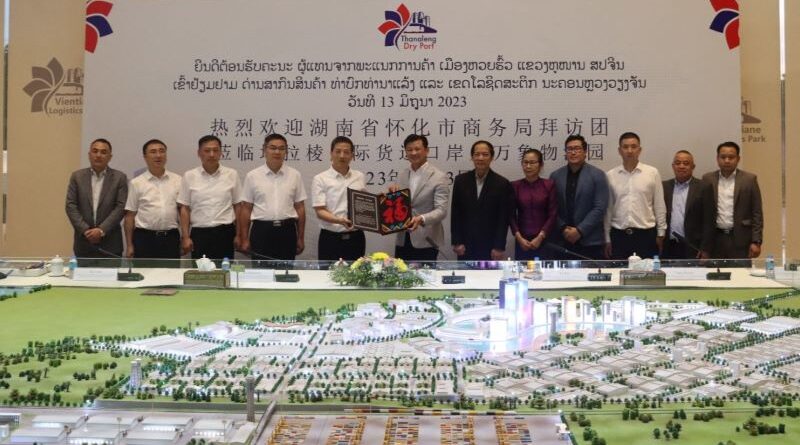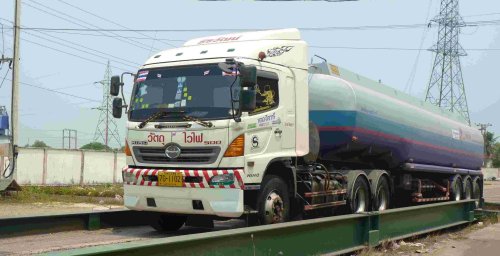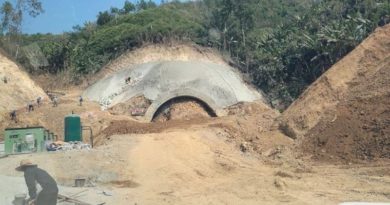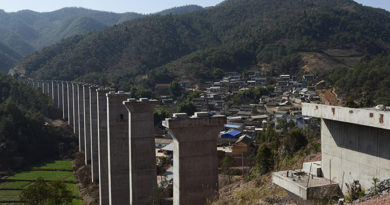Chinese Regulators, Business Executives Eye More ASEAN Market Opportunities Through Cost-effective Logistics Services via Laos
Source: Vientiane Times
Chinese officials and business executives on Tuesday visited the Thanaleng Dry Port and associated Vientiane Logistics Park to explore greater opportunities in the Asean market brought about by cost-effective services provided by Laos.
Laos is becoming an increasingly important trade gateway between China and Asean – the regional grouping of 10 Southeast Asian countries – thanks to the operation of the Laos-China and Laos-Thailand railways and the dry port where the railways converge.
“Laos is a gateway for China to integrate commercially with the Asean region,” Chairman of the Vientiane Logistics Park Co., Ltd., Mr Chanthone Sitthixay, told the guests.
Led by Xu Zhongjian, Secretary of China’s CPC Huaihua Municipal Committee, the Chinese delegation comprised representatives of the Huaihua Municipal Commerce Bureau, Huaihua Municipal Commission of Development and Reform, and company executives.
Mr Chanthone added that the signing of a cooperation document between the Thanaleng Dry Port and Hunan Huaihua International Land Port Development Co., Ltd. was a new milestone in improving services and enhancing cooperation.
Under the agreement, which was signed on June 13, the two sides pledged to work together to integrate rail transport services. They agreed to organise round trips by rail between Huaihua and Laos together with information sharing among other areas.
Mr Chanthone said that if both sides can maximise and make full use of each other’s capacities, growing logistics connectivity will significantly bolster trade links between Vientiane and Huaihua City (in Hunan province), and the region as a whole.
Mr Xu said the visit by his delegation aimed to push for fruitful cooperation between Laos’ dry port and the Chinese land port, which is an important platform for Hunan in connecting to Asean and Regional Comprehensive Economic Partnership (RCEP) member countries.
As the dry port and land port both integrate with the Belt and Road Initiative – a global transport infrastructure network – the two sides foresee greater opportunities for cooperation brought about by growing connectivity.
So far this year, trains from Huaihua have made 21 journeys on the Laos-China Railway, Mr Xu said through an interpreter.
The two sides have also enjoyed business-to-business links. In May this year, Lao business operators took part in a trade expo held in Huaihua, he added. Noting the signing of the cooperation agreement between the two ports, Mr Xu said it would “broaden cooperation between the ports and bolster trade between China and Laos.”
He invited executives of the dry port to visit Huaihua to explore cooperation and opportunities. Mr Chanthone gave the Chinese delegation a briefing on the US$727-million dry port and Vientiane Logistics Park.
Since becoming operational in December 2021, the multimodal transport node dry port last year handled almost 50,000 containers, which were dispatched to countries such as Vietnam, Cambodia, Myanmar, Malaysia, Singapore, Thailand, China and Russia.
Thanks to its cost-effective services, more and more business operators are using this trade route for the import and export of goods.
The President of Thailand’s Kaocharoen Train Transport Co., Ltd., Panya Paputsaro, whose company has made several shipments, mainly consisting of durian, from
Thailand to China, said shipment by rail cuts transport costs by 30 percent. In addition, speedy delivery brings fresher fruit to Chinese customers.
Mr Chanthone said his company is developing a logistics complex comprising seven zones, including an export processing zone, where investors are welcome to do business.
Goods manufactured or assembled in Laos enjoy privileged access to markets in countries whose governments have waived or reduced import tariffs on made-in-Laos products, according to the developer.
More than 30 countries including Australia, Canada, members of the European Union (EU 28), Japan, New Zealand, Norway, Russia, Switzerland and Turkiye have extended such privileges to Laos.





